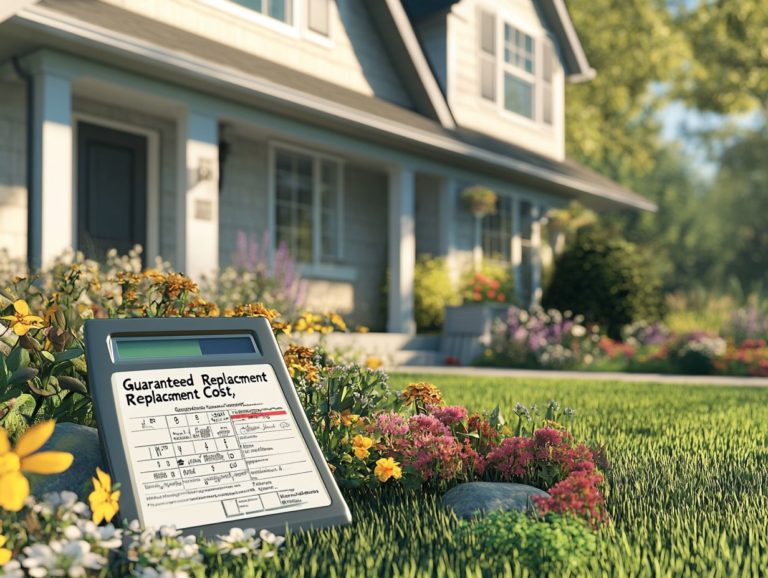What to Know About Landlord Insurance Types
Landlord insurance is crucial for you as a property owner, safeguarding your investment while managing the risks that come with renting out residential spaces.
This guide will explain the key components of landlord insurance, detailing its definition and purpose, along with various types of coverage available, such as property damage, liability, and loss of rental income.
It will also highlight important factors to consider when selecting a policy and offer tips for saving money without sacrificing your protection. Whether you re a seasoned landlord or just starting on this journey, grasping these elements will empower you to make informed decisions for your rental properties.
Contents
- Key Takeaways:
- Understanding Landlord Insurance
- Types of Landlord Insurance
- Factors to Consider When Choosing Landlord Insurance
- Smart Ways to Slash Your Landlord Insurance Costs!
- Frequently Asked Questions
- What types of insurance should landlords know about?
- What does property insurance cover for landlords?
- Do landlords need liability insurance?
- What is loss of rental income insurance?
- Are there any other types of landlord insurance that may be beneficial to have?
- How much does landlord insurance typically cost?
Key Takeaways:

Landlord insurance is your shield against financial losses. Make the right choice to protect what matters!
Landlord insurance covers property damage, liability, and loss of rental income.
Consider property type, location, tenant screening, and coverage limits when choosing a policy.
Save money by comparing policies, bundling with other insurance, and implementing risk management strategies.
Understanding Landlord Insurance
Landlord insurance serves as a specialized form of property coverage, expertly tailored to shield you from the many risks associated with renting out your properties.
Unlike homeowners insurance, which focuses primarily on personal residences, landlord insurance offers comprehensive protection specifically designed for rental properties. This means you re safeguarded against risks such as property damage, liability claims, and loss of rental income.
For landlords like you, this insurance is essential. It helps mitigate financial risks and ensures that your rental income remains stable, even when facing challenging situations.
Definition and Purpose
The primary purpose of landlord insurance is to offer you financial protection against the various risks that come with managing rental properties.
Think of this type of insurance as your safety net, ensuring that unexpected events like tenant damages, natural disasters, or vandalism won t lead to overwhelming financial burdens.
Key components include liability protection, which protects you from claims if someone gets hurt on your property. You ll also find coverage for property damage, addressing repairs needed due to incidents like fire or theft.
You can also choose extra coverage options like loss of rental income, which compensates you if your property becomes uninhabitable due to covered events. This helps preserve your financial stability and minimizes the risks that could threaten your investment.
Types of Landlord Insurance
Let s explore the different types of landlord insurance that can safeguard your investment! Landlord insurance offers a range of coverage options designed to protect you from the many risks associated with your rental properties.
This includes safeguarding against property damage, liability claims, and even the potential loss of rental income.
Property Damage Coverage
Property damage coverage is an essential aspect of landlord insurance, designed to safeguard you from financial losses associated with damage to your rental properties from various causes.
This insurance typically encompasses a broad spectrum of incidents, including catastrophic events like fires, floods, and extreme weather conditions such as hurricanes or tornadoes.
For instance, if a sudden storm wreaks havoc on the roof of your rental unit, property damage coverage can alleviate the financial burden of repair costs, allowing you to preserve your investment without facing overwhelming expenses.
In the case of less severe yet still damaging occurrences like a broken pipe that leads to water damage you can file claims to recover the expenses related to restoring the property. Generally, repairs to the structure, plumbing, electrical systems, and even permanent fixtures are included, ensuring you are protected from potentially crippling repair bills.
Liability Coverage

Liability coverage within landlord insurance is designed to protect you from legal claims that may arise due to injuries or damages occurring on your rental property.
This coverage is essential for safeguarding you against unforeseen incidents, such as a tenant slipping on a wet floor or a visitor getting injured from faulty stairs. In these scenarios, liability coverage can assist with medical expenses, cover legal fees from lawsuits, and even protect against claims related to damage to a tenant s personal belongings.
Imagine a fire unexpectedly spreading and damaging a tenant’s property. Liability protection helps you handle this situation effectively.
Tenant insurance also enhances your liability coverage, providing extra peace of mind for both you and your tenants.
Loss of Rental Income Coverage
Loss of rental income coverage is a vital part of your landlord insurance, ensuring that you receive compensation for lost rental payments due to unexpected events.
This protection kicks in when unforeseen circumstances prevent tenants from occupying your rental property. Events like natural disasters, fire damage, or significant repairs required to maintain the property s habitability can create gaps in your rental income.
For example, if a severe storm causes substantial roof damage, forcing your tenants to vacate, this coverage can offer you crucial financial relief. Similarly, if emergency plumbing repairs arise, the resulting downtime may also be covered, making it easier to manage the financial challenges of unexpected vacancies or reduced income.
Factors to Consider When Choosing Landlord Insurance
When selecting landlord insurance, consider several factors to ensure that the coverage aligns with the unique needs of your rental property and your financial objectives.
Property Type and Location
The type of property you own and its location are key in determining the right landlord insurance coverage, as various properties face different levels of risk. Understanding these factors is essential for landlords.
For instance, single-family homes typically have different insurance requirements compared to short-term rentals, such as vacation homes. The location whether urban or rural also significantly impacts the likelihood of claims, with urban properties often facing higher crime rates and environmental risks.
This distinction affects both the overall cost of your premiums and the specific coverage required to protect against potential liabilities. By thoroughly assessing both the type of property and its location, you can ensure that you select a policy that adequately safeguards your investment while aligning with your financial goals.
Tenant Screening Process
A thorough tenant screening process is crucial for landlords, helping to minimize risks associated with rental properties and influencing insurance coverage and premiums.
By carefully evaluating potential tenants, you can identify red flags like poor credit histories, past evictions, or unreliable references, which could lead to costly issues later on.
This proactive approach not only reduces the chances of payment delays or property damage but also enhances the overall stability of your rental income.
Screening tenants carefully helps you avoid problems like missed payments or property damage. It can also lead to lower insurance costs.
Ultimately, making safe and responsible tenant selections provides you with peace of mind and better protection against financial claims.
Cost and Coverage Limits

Understanding the cost and coverage limits of landlord insurance is essential for you as a landlord. This knowledge helps you make informed decisions that align with your financial strategy.
It not only aids you in selecting the right policy but also enables you to analyze how factors like deductibles and coverage limits impact your overall expenses.
Deductibles are the amounts you pay out of pocket before your insurance kicks in. This can significantly influence your premium costs. Coverage limits define the maximum amount your insurer will pay for a claim, shaping your financial responsibilities and levels of protection.
Finding the right balance between cost and adequate coverage is crucial. This ensures you can safeguard your investments while maintaining financial security in the face of unexpected events.
Smart Ways to Slash Your Landlord Insurance Costs!
Landlords have various strategies to reduce insurance premiums without compromising on coverage quality for their rental properties.
Comparison Shopping
Comparison shopping is essential for landlords seeking the best rates and coverage options for their landlord insurance. By evaluating various policies, you can find those that align with your unique needs.
Coverage options detail what incidents are included in the policy and are crucial for understanding your potential liabilities. Examining the deductibles is key to gauging the out-of-pocket costs you might face during a claim.
Make sure to check customer service ratings they can save you headaches later! By weighing these elements, you can secure a policy that provides optimal financial protection and enhances your peace of mind while managing your properties.
Bundling Policies
Bundling your insurance policies can provide substantial discounts and streamline coverage, especially when managing multiple properties.
Merging landlord insurance with homeowners or auto insurance allows you to enjoy lower premiums and a straightforward management experience for your insurance portfolio.
This strategy leads to financial savings and reduces the hassle of juggling multiple providers and payment schedules. When you consolidate your policies, you often gain access to comprehensive coverage that better protects your investments.
Having a single point of contact for claims helps improve efficiency, allowing you to concentrate on your properties rather than navigating the complexities of the insurance world.
Risk Management Strategies
Implementing effective risk management strategies enables you to reduce insurance premiums while safeguarding your rental properties from potential claims.
Proactively addressing potential issues, like conducting regular property maintenance, helps prevent minor repairs from turning into costly damages. Tenant education is equally vital; when renters understand safety protocols and their responsibilities, it creates a collaborative environment that minimizes accidents.
Ensuring adequate safety measures, such as installing smoke detectors and secure locks, further bolsters your property s defense against liability claims.
These practices protect your property and foster a more harmonious landlord-tenant relationship, ensuring peace of mind for everyone involved.
Frequently Asked Questions

-
What types of insurance should landlords know about?
Landlords should know about the three main types of landlord insurance: property insurance, liability insurance, and loss of rental income insurance.
-
What does property insurance cover for landlords?
Property insurance covers the physical structure of the rental property and personal belongings used for the rental business, such as appliances or furniture.
-
Do landlords need liability insurance?
Yes, liability insurance is important for landlords. It provides coverage for legal fees or damages if a tenant or visitor is injured on the rental property.
What is loss of rental income insurance?
Loss of rental income insurance is a type of insurance that helps landlords avoid losing money if their rental property becomes unlivable due to a covered event, like a fire or natural disaster. This insurance is essential for protecting your income and peace of mind during repairs.
Are there any other types of landlord insurance that may be beneficial to have?
Besides the three main types of landlord insurance, landlords should consider additional coverage. Umbrella insurance offers extra liability protection, and flood insurance is vital if your rental property is in a flood-prone area. Consider these options to safeguard your property and minimize risk.
How much does landlord insurance typically cost?
The cost of landlord insurance varies based on factors like the property’s location, size, and chosen coverage limits. Prices can range from $500 to $1,500 per year, so it’s crucial to shop around and find the best coverage for your needs. Act now to protect your investment!






